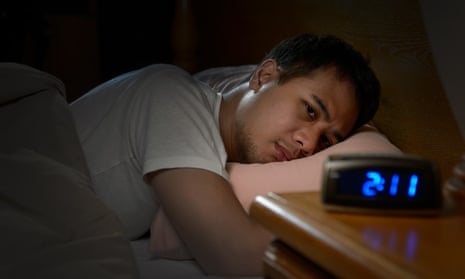Do you have a strict bedtime? A sunrise-mimicking alarm clock? A vial of “sleep oil”? A white noise machine? A ban on screens past 10pm?
We are, as a culture, obsessed with sleep. Not getting enough, not having the right kind; even sleeping too much. Study after study piles up to warn us that any of the above will give us cancer or dementia. And this week, a new punishment for failing to sleep well has appeared, in the form of the “sleepalyser” (not, admittedly, the official term): blood tests administered after a road accident in order to determine if you were under the “sleep limit”.
The Australian Government Office of Road Safety has been investigating this possibility for the good reason that tiredness is a major factor in collisions. In the UK, it accounts for up to one in five, rising to a quarter of fatal and serious crashes. The researchers reckon these tests could be rolled out for use by police within a couple of years, with an accompanying “legal drowsy driving limit”.
The problem with this proposal is that it only adds to the impression that any failure to sleep is our fault. People with debilitating conditions such as insomnia have always been focused on improving their symptoms. But over the past few years, a good night’s sleep has taken on a new status: as something that everybody must pursue and optimise via gadgets and goals. “Sleep hygiene”, a term once used in the treatment of actual insomniacs, has entered the wellness lexicon. Combinations of herbs, special lighting and carefully timed baths have taken on an air of mysticism, as though our minds and bodies must be tricked into performing this basic, biological task. Sleep – as old as life itself, and inherently free – is now worth hundreds of billions of dollars a year, and growing.
All of this ignores several key things. The first is that there is no sleep ideal. The mythical eight hours (much like the “recommended” 10,000 steps a day) is not a data-backed recommendation by health bodies, but is rather entirely made up. Different people need different amounts: seven hours might be right for you. Warnings of a “sleep loss epidemic” do the rounds every few months, but have never been backed up by reliable data – in most western countries, we seem to be broadly sleeping more than we did half a century ago, despite the rise of screens, stress and all the other things that allegedly keep us awake. If anything has changed, it’s that we’ve worked ourselves up into a panic about the whole thing, and could thereby be keeping ourselves awake – an effect that has been labelled orthosomnia.
The second is that the real story of sleep is not one of personal responsibility, but of social and economic privilege. Sleep loss epidemics are real – but they’re playing out among shift workers and those with caring responsibilities, not across the population as a whole. Those on lower incomes are more likely to sleep less, as are minorities. Women are more likely to be diagnosed with sleep disorders than men. Our sleep reflects not the bedtime tea we drink or what type of light our phone screen emits, but what is demanded of us in our waking lives. Those who chronically lack sleep are either suffering from a genuine condition, or from an economy that refuses to let them rest.
Take truck drivers. A 2018 survey by the union Unite found that almost a third of surveyed HGV drivers said they had fallen asleep behind the wheel, and two-thirds blamed the long working days demanded by their employers. The union said there was a “chronic shortage” of truck stop facilities to allow proper rest, and that deaths of HGV drivers in accidents – of which there had been around 20 per year in the previous five years – were not properly investigated or logged as workplace deaths. Three years later, hauliers staged a protest against their “appalling” conditions and pay by taking the one-hour rest break they are meant to be entitled to by law. But when the number of drivers plummeted during the pandemic thanks to Brexit, the government – despite all the data on fatigue and road deaths – responded by temporarily extending the number of hours drivers could legally work.
The researchers behind the new sleep blood tests have suggested that they could be used in commercial contexts such as mining, aviation and trucking. If so, there’s a chance that employers and legislators would be forced to reckon with the effect their practices have on sleep: short breaks and ever-increasing hours could become commercially unviable. A terrible night’s sleep could be recognised as requiring a sick day so a driver wasn’t under the sleep limit.
Or, as is more likely, the culture of personal blame could balloon further. Driving for 15 hours a day? Perhaps try a lavender sleep spray. Two toddlers, no childcare: have you considered a £1,000 mattress? Nurses covering a double shift in a short-staffed hospital – did you use your phone before bed? Try harder – I’d hate to have to sleepalyse you.

